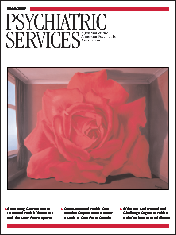Use of Outpatient Commitment or Related Civil Court Treatment Orders in Five U.S. Communities
Abstract
OBJECTIVE: Outpatient commitment and a number of related civil court mechanisms are used to attempt to improve adherence to mental health treatment in the community. This study examined lifetime use rates and correlates of outpatient commitment or related civil court-ordered outpatient treatment in five U.S. communities. METHODS: A total of 1,011 outpatients were recruited and interviewed from five sites: Chicago; Durham, North Carolina; San Francisco; Tampa; and Worcester, Massachusetts. RESULTS: Between 12 and 20 percent of consumers reported outpatient commitment or related civil court-ordered treatment. A history of outpatient commitment or related court orders was significantly more common among participants who lived in staffed residential settings, received assistance with outpatient treatment, and reported poor social support as well as among those who had co-occurring substance use problems, poor psychosocial functioning, a recent history of violent behavior, higher rates of lifetime hospitalization and of involuntary hospitalization, and recent police encounters during mental health crises. Nearly three-quarters of persons who reported outpatient commitment or related civil court orders also reported experiencing other forms of leveraged treatment, and these multiple leveraged-treatment experiences were strongly associated with high perceived coercion and poor satisfaction with treatment. CONCLUSIONS: A history of civil court-ordered outpatient treatment was most common among persons with mental illness who came into contact with multiple mental health, social welfare, and criminal justice agencies, many of which applied their own forms of leveraged treatment in attempts to improve adherence. Further research is needed to guide policy makers in implementing coordinated and effective responses to treatment nonadherence.



